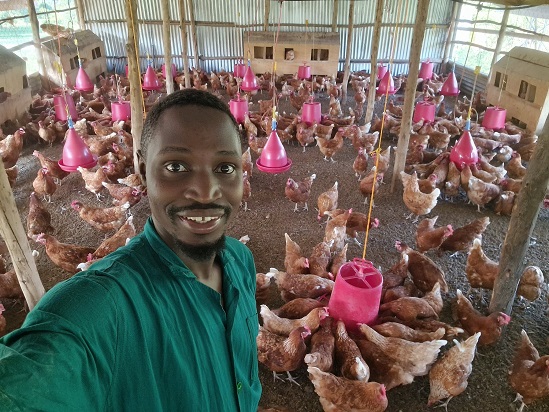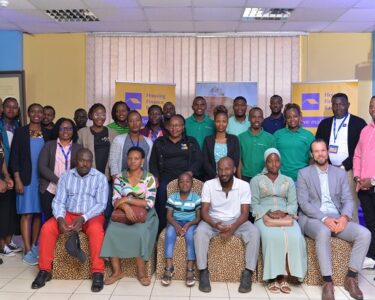Five years ago, Dr. Daniel Masaba seemed destined for a typical career path in medicine. Fresh out of medical school, he had secured employment as a doctor and looked set for a lifetime in hospitals and clinics. But behind the stethoscope, Masaba was restless. He wanted something more—a venture that could create long-term wealth and impact. At first, he wasn’t sure what direction to take, dabbling in ideas that ranged from greenhouse farming to other small projects. It was only after speaking to an agricultural expert that he was convinced poultry was the way to go. That single conversation planted the seed for what would become Farm Up, one of Uganda’s largest poultry operations.
Today, just a few years later, Farm Up is a sprawling agribusiness empire. The hatchery produces more than 120,000 chicks every week, the farm itself houses over 20,000 birds, and Masaba has diversified into goats, sheep, cattle, and crop farming on hundreds of hectares of land. It is a story of resilience, ambition, and the courage to walk away from one of the most respected professions in order to build something entirely different.
Masaba began modestly in 2019. Having saved money from his medical job, he could only afford to buy 750 birds. His father allowed him to use a piece of family land, and he put up a semi-finished poultry structure where he launched the business. A year later, he expanded to 2,000 birds. “I started in a half-completed building, on land that wasn’t mine, with just 750 chickens,” he recalls. “Many people thought I was crazy, especially when I left medicine. But I knew exactly what I was doing. It was a risk, yes, but a calculated one.”
He admits that low pay for medical doctors was a factor in his decision. “The reality is that doctors here are not well paid. I wanted something bigger. Initially, I had set my mind on greenhouse farming, but an expert I consulted told me poultry had greater potential. That was the turning point.”
The early days were grueling. Long hours, constant trial and error, and financial strain tested his commitment. But slowly, the farm started to generate returns. “After a few months, I realized this thing could actually make money,” he says with a smile. “That’s when I decided to go all in.”
Farm Up has since grown into a highly mechanized and professional operation. Water and feeding systems are automated, ensuring minimal contact between workers and birds to reduce the risk of disease. Even the egg collection system is semi-automated—hens lay inside the structure while eggs roll out for collection, limiting exposure. The farm is housed in a massive two-story structure, measuring 100 meters by 100 meters, built for efficiency and biosecurity.
Managing costs is a constant challenge, especially with feed. Poultry consumes enormous amounts of maize, and Masaba’s birds go through more than 10 tons of feed every day. To cut expenses, Farm Up cultivates its own maize on over 200 hectares of land, producing feed in-house for both poultry and staff consumption. Even then, demand outstrips supply. “The biggest challenge is feed,” Masaba explains. “Even with all the land we cultivate, it’s not enough. When feed prices rise, it eats into profits and discourages buyers. That volatility is tough to manage.”
Beyond poultry, Masaba has expanded into goats, sheep, and cattle—around 150 head at last count—while also supporting crop farming. The enterprise now employs over 200 people, with 100 of them working directly in poultry. For him, the impact is bigger than profits. “Everyone needs food,” he says. “This is a way of life. On big days, we slaughter animals and share meat with surrounding villages. People feel the impact of this farm in their daily lives.”
The journey hasn’t been without frustrations. Human resource management is one. “Workers can be very complicated. You train them and they leave. Sometimes you trust, and they steal. That has been one of the hardest parts,” he admits. Disease control is another constant battle, which is why he enforces strict biosecurity measures. “I don’t allow many visitors here because people carry diseases. One mistake could wipe out everything.”
Still, Masaba has no regrets about leaving medicine. “This is the best decision of my adult life,” he insists. “I believe farming has given me the freedom and impact I could not have achieved in medicine, at least not so quickly. What I have now would have taken me two lifetimes if I had stayed in the hospital.”
For young people interested in agriculture, his message is clear: start small, learn, and grow. “You can start from anywhere,” he says. “What matters is vision, principles, and discipline. Work, save money, and invest wisely. Don’t just rely on theory—go outside, learn from others, and commit yourself fully.”
Farm Up is now a symbol of what determination and bold choices can achieve. To Masaba, farming isn’t just a business; it’s a calling. He may have hung up his white coat, but by feeding thousands of people and creating jobs, he has found another way to heal communities—this time, not with medicine, but with food.






